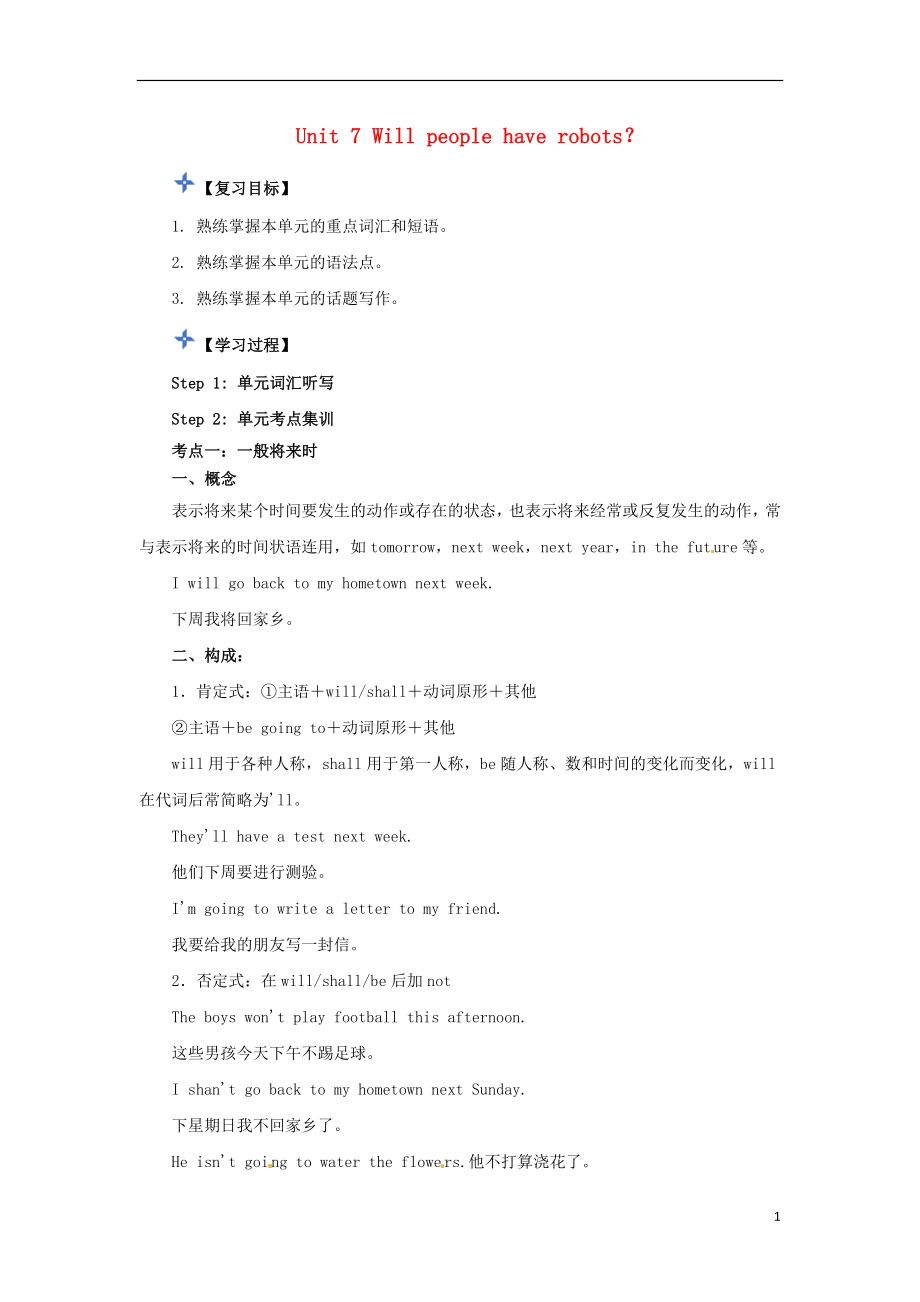《2018年秋八年級(jí)英語上冊(cè) Unit 7 Will people have robots復(fù)習(xí)導(dǎo)學(xué)案 (新版)人教新目標(biāo)版》由會(huì)員分享���,可在線閱讀���,更多相關(guān)《2018年秋八年級(jí)英語上冊(cè) Unit 7 Will people have robots復(fù)習(xí)導(dǎo)學(xué)案 (新版)人教新目標(biāo)版(4頁珍藏版)》請(qǐng)?jiān)谘b配圖網(wǎng)上搜索。
1���、
Unit 7 Will people have robots�?
【復(fù)習(xí)目標(biāo)】
1. 熟練掌握本單元的重點(diǎn)詞匯和短語����。
2. 熟練掌握本單元的語法點(diǎn)。
3. 熟練掌握本單元的話題寫作�����。
【學(xué)習(xí)過程】
Step 1: 單元詞匯聽寫
Step 2: 單元考點(diǎn)集訓(xùn)
考點(diǎn)一:一般將來時(shí)
一����、概念
表示將來某個(gè)時(shí)間要發(fā)生的動(dòng)作或存在的狀態(tài),也表示將來經(jīng)?�;蚍磸?fù)發(fā)生的動(dòng)作,常與表示將來的時(shí)間狀語連用����,如tomorrow,next week�����,next year���,in the future等�����。
I will go back to my hometown next week.
下周我將
2�����、回家鄉(xiāng)。
二�����、構(gòu)成:
1.肯定式:①主語+will/shall+動(dòng)詞原形+其他
②主語+be going to+動(dòng)詞原形+其他
will用于各種人稱����,shall用于第一人稱����,be隨人稱�����、數(shù)和時(shí)間的變化而變化���,will在代詞后常簡(jiǎn)略為'll�。
They'll have a test next week.
他們下周要進(jìn)行測(cè)驗(yàn)��。
I'm going to write a letter to my friend.
我要給我的朋友寫一封信����。
2.否定式:在will/shall/be后加not
The boys won't play football this afternoon.
3、這些男孩今天下午不踢足球���。
I shan't go back to my hometown next Sunday.
下星期日我不回家鄉(xiāng)了�。
He isn't going to water the flowers.他不打算澆花了�����。
3.一般疑問句:將will/shall/be提到主語前面
Will the students watch the match?學(xué)生們要去看比賽嗎�����?
Are you going to visit your friends��?你要去看望你的朋友們嗎����?
(1)“will/shall+動(dòng)詞原形”表示單純意義“將來要(會(huì))······”,沒有計(jì)劃性��。
They
4���、will go with us.他們將和我們一起去����。
(2)“be going to+動(dòng)詞原形”表示“將要發(fā)生······”“打算����、計(jì)劃��、決定要······”。
What are you going to do next Sunday�����?下個(gè)星期日你打算做什么����?
考點(diǎn)二; 辨析:be going to 與 will
(1)對(duì)未來事情的預(yù)測(cè)用“ will + 動(dòng)詞原形”表達(dá),will 沒有人稱和數(shù)的變化���。變否定句要在will 后面加not, 或者縮略式won’t, 變一般疑問句將will 提至句首���。
Will planes be large in the future? 未來飛機(jī)會(huì)很大嗎
5、�����?
Yes, they will. / No, they won’t.是的�,會(huì)。/不����,不會(huì)。
(2)will 常表示說話人相信或希望要發(fā)生的事情�,而be going to 指某事肯定發(fā)生�����,常表示事情很快就要發(fā)生�����。
I believe Lucy will be a great doctor. 我相信露西會(huì)是一個(gè)好醫(yī)生�。
(3)陳述將來的某個(gè)事實(shí)用will����。
I will be ten years old next year.明年我將十歲。
(4)表示現(xiàn)在預(yù)測(cè)將來要做的事情用 will����。
I’m tired I will go to bed. 我很累,我將去睡覺��。
(5)表示意愿
6�、用will.
I’ll ( I will ) tell you the truth.我將告訴你真相。
(6)表示計(jì)劃��、打算要做的事情用 be going to, 而不用 will.
4.there be句型的一般將來時(shí)
(1)there be句型的一般將來時(shí)的構(gòu)成是“There will be+主語+其他”����,意為“將會(huì)有······”�����。
There will be a nice basketball match tonight.
今天晚上會(huì)有一場(chǎng)精彩的籃球賽。
(2)其一般疑問句形式為“Will there be+主語+其他?”��,其肯定回答是:Yes��,there will.�,否定
7、回答是:No�,there won't.。
—Will there be a nice basketball match tonight��?
今天晚上會(huì)有一場(chǎng)精彩的籃球賽嗎����?
—Yes,there will./No�,there won't.是的,會(huì)有�����。/不���,沒有���。
(3)其否定句形式為“There won't be+主語+其他.”�����,意為“將不會(huì)有······”���。
There won’t be any money in 100 years.
100年后將不會(huì)有錢幣。
學(xué)以致用
一���、單項(xiàng)填空����。
1. Mr. Green���,a famous writer����,____ our school
8�、 next week.
A.visited B.visits
C.was visiting D.will visit
2. I think cities will be really big and crowded because
there will be a lot ____ people in 2050.
A.much B.more C.many D.less
3. If there are ____ people driving,there will be ________ air pollutio
9��、n.
A.less;less B.less�;fewer
C.fewer;fewer D.fewer����;less
4. —Will there be computers in people's homes?
—____.
A.Yes��,there will B.Yes��,there be
C.No�����,there will D.No��,it won't
二�、根據(jù)句意用所給詞的適當(dāng)形式填空。
1. I think there (be) fewer books in
10�、2050
because people will read on computers.
2. His grandma is 83 (year) old.
3. We can finish the work with (little) money
and (few) people than they can.
4. There are fewer (student) in our school.
Step 3: 單元寫作訓(xùn)練
假如你是美國(guó)中學(xué)生Henry,你有一個(gè)夢(mèng)想��,希望將
11���、來擁有一個(gè)名叫Superman的機(jī)器人��,他可以幫你做以下事情:
1.打掃房子和購物�;
2.陪你下棋和玩電腦;
3.還是一位百事通����,你不懂的知識(shí)他都可以幫你找到答案。
請(qǐng)你給你的朋友Dave寫一封80詞左右的電子郵件����,和他分享你的夢(mèng)想。
___________________________________________________________________________________________________________________________________________________________________________________________________________________________________________________________________________________________________________________________________________________________________________________________________
Step 4: 實(shí)戰(zhàn)演練
1.在線檢測(cè):請(qǐng)你在平臺(tái)完成Unit 7 Will people have robots��?單元檢測(cè))�,提交后自己看錯(cuò)題及解析。
4
 2018年秋八年級(jí)英語上冊(cè) Unit 7 Will people have robots復(fù)習(xí)導(dǎo)學(xué)案 (新版)人教新目標(biāo)版
2018年秋八年級(jí)英語上冊(cè) Unit 7 Will people have robots復(fù)習(xí)導(dǎo)學(xué)案 (新版)人教新目標(biāo)版

